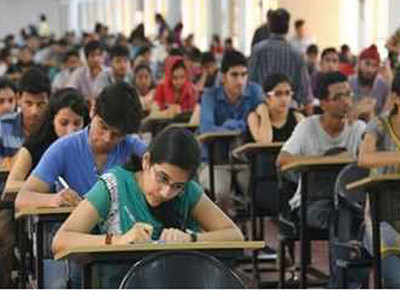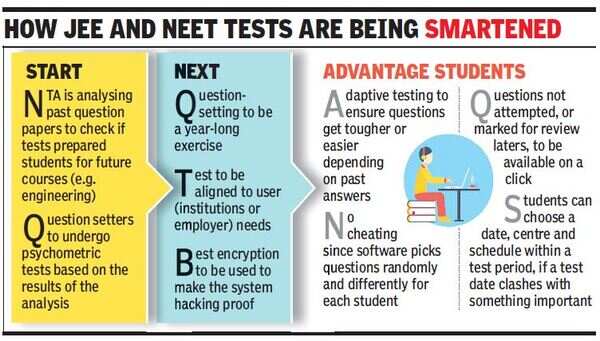- News
- Education News
- News
- Unique question paper for each JEE, NEET examinee?
Trending
This story is from July 18, 2018
Unique question paper for each JEE, NEET examinee?
Competitive tests such as JEE main, NEET-UG and UGC NET are set for a major overhaul from next year. The changes include having a unique set of questions for each candidate, with a software picking questions at random, and multiple dates for taking an exam.

Representative image
Key Highlights
- Competitive tests such as JEE main, NEET-UG and UGC NET are set for a major overhaul from next year
- These include having a unique set of questions for each candidate, with a software picking questions at random, and multiple dates for taking an exam
- The overhaul is being driven by the new National Testing Agency
NEW DELHI: Competitive tests such as JEE main, NEET-UG and UGC NET are set for a major overhaul from next year. The changes include having a unique set of questions for each candidate, with a software picking questions at random, and multiple dates for taking an exam.
The overhaul is being driven by the new National Testing Agency (NTA), which will conduct its first exam in December 2018 — the University Grants Commission's National Eligibility Test.The agency will annually test around 1.5 crore candidates.
NTA plans to rely heavily on technological tools like artificial intelligence, psychometric analysis and computer-based adaptive testing — where candidates are taken to the next level of questions once they are through with easier questions — to change the way exams are conducted in India.

NTA officials said the test will be designed in a way that rote learning and intensive coaching are not of much help to candidates unless she is thorough with the syllabus. "There will be distractors (multiple choice questions) designed to fox you. And with millions of questions (items) to be prepared instead of a couple of question papers for a particular test, you will be at the mercy of the software's algorithm which will pick up items at random for your test at a particular date, based on the set difficulty-level," an official said.
Sources said these computer-based tests will have several advantages. Candidates will be able to revisit questions later or keep some for review once the easier ones are done. In case the exam date doesn't suit a candidate, she will be free to choose another date (from a given set). And, as has been reported, if the candidate is unhappy with her score, she can take the exam again after three months.
Video: JEE, NEET tests set for major overhaul - The changes
"It is going to be completely driven by technology. Artificial intelligence tools will be used to setting the questions and preparing the key for the correct answers. This will increase the capacity of NTA to do the things faster,"" a human resource development ministry official said.
NTA is currently undertaking psychometric analysis of the previous years' tests. "There are three things we are analysing from previous papers. We are seeing how each question has fared to determine its level of difficulty. Second, we are looking is how the distractors (the multiple choices for a question) have functioned. These distractors should be able to properly distract the person, so that only the ones who know the subject are able to answer correctly," said a psychometric expert analysing the JEE main data at NTA.
"The third we are looking at is how well the entire question paper has functioned. We are analysing whether these were reliable tests or not," the expert added.
According to the HRD official, "A number of new things are going to be tried out, such as psychometric analysis of data, psychometric analysis to train the item writers, web-based test writing with AI technology so that there are no errors in the question and answer keys, as well as computer adaptive testing."
The overhaul is being driven by the new National Testing Agency (NTA), which will conduct its first exam in December 2018 — the University Grants Commission's National Eligibility Test.The agency will annually test around 1.5 crore candidates.
NTA plans to rely heavily on technological tools like artificial intelligence, psychometric analysis and computer-based adaptive testing — where candidates are taken to the next level of questions once they are through with easier questions — to change the way exams are conducted in India.
"The tests will be 100 per cent safe. The highest level of encryption will be used so that no one can hack into the system," said Vineet Joshi, director general of NTA.

NTA officials said the test will be designed in a way that rote learning and intensive coaching are not of much help to candidates unless she is thorough with the syllabus. "There will be distractors (multiple choice questions) designed to fox you. And with millions of questions (items) to be prepared instead of a couple of question papers for a particular test, you will be at the mercy of the software's algorithm which will pick up items at random for your test at a particular date, based on the set difficulty-level," an official said.
Sources said these computer-based tests will have several advantages. Candidates will be able to revisit questions later or keep some for review once the easier ones are done. In case the exam date doesn't suit a candidate, she will be free to choose another date (from a given set). And, as has been reported, if the candidate is unhappy with her score, she can take the exam again after three months.
JEE, NEET tests set for major overhaul from next year
"It is going to be completely driven by technology. Artificial intelligence tools will be used to setting the questions and preparing the key for the correct answers. This will increase the capacity of NTA to do the things faster,"" a human resource development ministry official said.
NTA is currently undertaking psychometric analysis of the previous years' tests. "There are three things we are analysing from previous papers. We are seeing how each question has fared to determine its level of difficulty. Second, we are looking is how the distractors (the multiple choices for a question) have functioned. These distractors should be able to properly distract the person, so that only the ones who know the subject are able to answer correctly," said a psychometric expert analysing the JEE main data at NTA.
"The third we are looking at is how well the entire question paper has functioned. We are analysing whether these were reliable tests or not," the expert added.
According to the HRD official, "A number of new things are going to be tried out, such as psychometric analysis of data, psychometric analysis to train the item writers, web-based test writing with AI technology so that there are no errors in the question and answer keys, as well as computer adaptive testing."
End of Article
FOLLOW US ON SOCIAL MEDIA










